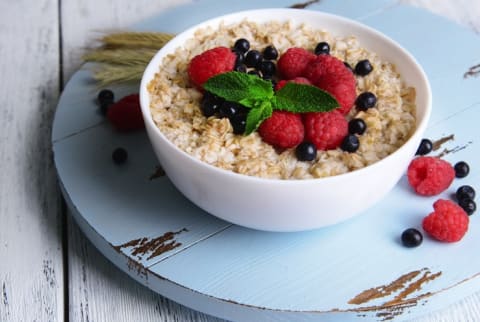Advertisement

Do you have acne? Do you frequently catch colds that take ages to heal? Have trouble sleeping? These could be signs that you're among the 12% of Americans who aren't getting enough zinc.
While many of us know we might need to get more magnesium or vitamin D, most have no idea that we might need more zinc. When we don't get enough, our cellular health is affected, which affects not only our immune system, but can also contribute to DNA damage.
As a nutritionist, I'd like to share with you 10 signs that could signal a zinc deficiency:
1. Poor immunity
Do you catch one cold after the other or regularly suffer from all kinds of infections? The immune system cannot work properly without adequate zinc levels.
2. Poor skin
Did you know that 6% of total body zinc is located in your skin? Several studies suggest that people suffering from acne have lower levels of zinc.
3. Allergies
Constant stress can lead to adrenal fatigue, which can cause a deficiency in zinc, which plays an important role in blocking the release of histamine into the blood.
Excess histamine running through your system can give you typical allergy symptoms (think runny nose, rash, swelling, sneezing etc.), and it can also increase your overall sensitivity to allergens.
4. Leaky gut
When your gut leaks, particles from undigested food get into your bloodstream, which causes an immune response. Of course, zinc deficiency is not the only possible reason for a leaky gut, but zinc supplementation has been proven to tighten the gut wall.
5. Sleep disturbance
You probably know about melatonin, a hormone which helps you fall asleep. But did you know that zinc plays a significant role in both the production and regulation of melatonin? One study found that taking a supplement containing melatonin, magnesium, and zinc improved the sleep quality of people suffering from primary insomnia.
6. Attention disorders
In the US, approximately 6.4 million kids have been diagnosed with ADHD as of 2011. Attention-Deficit/Hyperactivity Disorder is a neurodevelopmental disorder, and although there is still not enough evidence to support treating ADHD with mineral and vitamin cures, numerous studies show a link between hyperactivity and low levels of urinary zinc.
7. Hair loss
Low levels of thyroid hormones could indicate that your body's not absorbing zinc, a condition that has been linked to hair loss.
8. Slow growth
Our bodies need zinc for the growth of healthy bones. Unfortunately, mild zinc deficiency is affecting growth of children and adolescents all over the world, even in developed countries.
9. Fertility struggles and poor pregnancy outcomes
Another side effect of irregular development is reduced fertility, which is an increasing problem around the globe. While zinc deficiency alone is unlikely to make you infertile, it plays an essential role in letting the reproductive system run smoothly.
In men, zinc is essential for normal testicular development and sperm motility. In women, low zinc levels have been associated with premature births, prolonged labor, low birth weight, and more.
10. Alzheimer's disease.
Alzheimer's disease has become an epidemic in developed countries. With zinc deficiency being one of the most common nutrient deficiencies in the elderly, lots of studies have been conducted on the subject, which show that in elderly patients zinc therapy can protect against cognition decline.
Who is at risk?
Frequent dieters, vegetarians and vegans, elderly people or those consuming lots of alcohol have a higher risk of zinc deficiency. The same holds for pregnant or lactating women, teenagers during growth spurts or puberty, or people with celiac disease, diabetes mellitus or recurring diarrhea.
If you want to increase your zinc-rich food intake, put these foods on your shopping list.
- Fresh oysters
- Grass-fed beef, lamb, chicken
- Pumpkin seeds
- Ginger root
- Pecans, Brazil nuts, peanuts, almonds, walnuts
- Split peas, lima beans
- Oats or buckwheat
Of course, you can also use a high-quality zinc supplement for general health support. When you want to address health need, talk to a health care practitioner.
Watch Next
Enjoy some of our favorite clips from classes
Enjoy some of our favorite clips from classes
What Is Meditation?
Mindfulness/Spirituality | Light Watkins
Box Breathing
Mindfulness/Spirituality | Gwen Dittmar
What Breathwork Can Address
Mindfulness/Spirituality | Gwen Dittmar
The 8 Limbs of Yoga - What is Asana?
Yoga | Caley Alyssa
Two Standing Postures to Open Up Tight Hips
Yoga | Caley Alyssa
How Plants Can Optimize Athletic Performance
Nutrition | Rich Roll
What to Eat Before a Workout
Nutrition | Rich Roll
How Ayurveda Helps Us Navigate Modern Life
Nutrition | Sahara Rose
Messages About Love & Relationships
Love & Relationships | Esther Perel
Love Languages
Love & Relationships | Esther Perel
What Is Meditation?
Box Breathing
What Breathwork Can Address
The 8 Limbs of Yoga - What is Asana?
Two Standing Postures to Open Up Tight Hips
How Plants Can Optimize Athletic Performance
What to Eat Before a Workout
How Ayurveda Helps Us Navigate Modern Life
Messages About Love & Relationships
Love Languages
Advertisement

What Men Are Getting Wrong About Mental Health, From A Psychologist
Stephen B. Poulter, PhD

Your Grandma's Go-To Supplement Is Once Again Popular (For A Good Reason)
Molly Knudsen, M.S., RDN

What Men Are Getting Wrong About Mental Health, From A Psychologist
Stephen B. Poulter, PhD

Your Grandma's Go-To Supplement Is Once Again Popular (For A Good Reason)
Molly Knudsen, M.S., RDN














